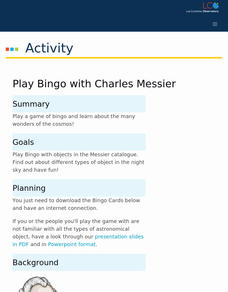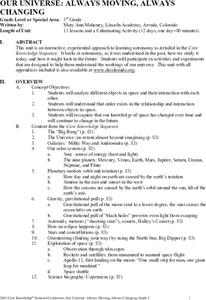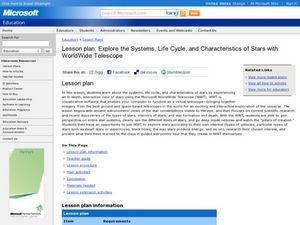Curated OER
Stars and Slopes
Students use the slopes of various curves plotted on log-log graph paper to classify stellar objects as binary stars, supernovae, or active galaxies.The data used in this lesson were obtained from X-ray astronomy satellites.
Curated OER
Making Magical Creatures Talk
Invite your young writers to take the reins with writing dialogue. Using two characters of their own creation, kids work with partners and then individually to write short conversations.
Starry Night Education
The Stars
Three astronomy activities in one resource! Here you will find one hands-on activity, one demonstration, both with discussion questions, and one activity worksheet. During these lessons young scientists discuss how stars are different,...
Curated OER
Who Wants to be a Millionaire: Solar System
Fourth and fifth graders will love showing what they know about the planets and our solar system. This game is fashioned after "Who Wants to be a Millionaire" and has the class work through fifteen different solar system related...
NASA
Raisin Bread Universe
What is the universal breakfast? The resource includes two activities, the first one observing oatmeal to understand the texture of the universe. Then, scholars measure raisin bread dough before and after it rises to represent the...
Las Cumbres Observatory
Play Bingo with Charles Messier
Let's play an out-of-this-world Bingo game! Using pre-made Bingo cards and an online randomizer, host a game of Bingo to practice identifying the objects of the cosmos. Pupils must match a picture shown to a similar picture on their...
Las Cumbres Observatory
Measure the Age of Ancient Cosmic Explosions
Supernova explosions mark the end of a star's life. Guide the class through an investigation that uses data to calculate the age of a supernova remnant. Using provided data and online software, they analyze data to determine the radius...
Las Cumbres Observatory
Calculating the Age of Solar System Objects
The number of craters on the surface of solar system objects has a direct correlation to its age. Learners use the concept to determine the age of several objects in the solar system. Using satellite images, they count craters within a...
American Museum of Natural History
Being an Astronomer: Neil deGrasse Tyson
An interview delves deep into the life of famous astronomer Neil deGrasse Tyson.
Curated OER
Our Universe: Always Moving, Always Changing
Students explore the main concepts of astronomy through the eleven lessons of this unit. The past, present, and future methods of studying the science are examined in this unit.
Curated OER
Solar System
In this Solar System instructional activity, 5th graders demonstrate knowledge of parts of the Solar System. Students unscramble letters to list these parts.
Curated OER
Chandra Spies the Longest Sound Wave in the Universe!
In this black hole worksheet, students use an x-ray image and a sound waves image to determine the size and the wavelength of the sound wave. This worksheet has 3 problems to solve.
NASA
Star Brightness
In this brightness of stars worksheet, high schoolers answer 7 questions about the apparent magnitudes of stars, the sun, and the moon. They compare the brightness of stars, galaxies, astronomical objects and the sun.
Curated OER
Explore the Characteristics of Stars with Microsoft WorldWide Telescope
Students explore the characteristics of stars. In this space science activity, students use the Microsoft WorldWide Telescope program to identify the properties of stars and identify the stars in the galaxy.
Curated OER
Hubble Space Telescope
Learners investigate the universe through the eyes of the Hubble space telescope. They conduct research from looking at the universe that is simulated with a digital projector. The images are projected onto the wall in a simulation of...
Curated OER
Stars and the Sun
Sixth graders research and state the differences between different stars and the sun. They tie the magnificence of space with the science fiction novel, "I Robot." Several worksheets and discussions are also covered within this lesson plan.
Curated OER
Pictures from Hubble Space Telescope
Students observe pictures taken by NASA's Hubble Space Telescope. From a given website, students observe images of the Einstein Cross, Black Eye Galaxy, Hoag's Object, merging and interacting galaxies and more. This lesson plan gives a...
Curated OER
Black Hole Lesson
Tenth graders experiment with detection techniques for black holes by modeling the rotation of galaxies with larger and larger masses in the center. They discover while some events cannot be directly observed they may be observable in...
Curated OER
The Rare Earth - How Rare Is Earth-Like Life?
Students systematically investigate the time frame for complex life to develop on Earth. They approximate how many other planets there may be harboring Earth-like complex life in our galaxy.
Curated OER
Solar System Adventure
Students study the solar system and our galaxy, then write a science fiction story based on what they discover. They utilize worksheets and access websites imbedded in this plan to gain ideas for their stories.
Curated OER
The Story Within Worksheet
In this reading artifacts worksheet, students imagine they have arrived on earth from another galaxy and write a description of an object they have found. Function, form , and meaning of the object are revealed when students answer 6...
Curated OER
The Solar System
Students describe the different bodies that make up our solar system, explain the place of our solar system within the Milky Way Galaxy and the universe, explain day and night and the Earth's movement, and describe the relationship...
Curated OER
Earth Science
Students explore the planets and celestial bodies in our solar system. For this outer space lesson, students identify the planets and record journal information about them and other celestial bodies. Students define outer space words.
Curated OER
ESL Galaxy.com
On this ESL website, teachers have access to a variety of ESL lesson plans and worksheets. Teachers can print games, crosswords, pronunciation worksheets, songs, and reading or writing exercises.

























